大学英语2课文+译文
新标准大学英语2综合教程课文翻译

第一单元大学已经不再特别了有这么一种说法:“要是你能记得20 世纪60 年代的任何事情,你就没有真正经历过那段岁月。
”对于在大麻烟雾中度过大学时光的那些人,这话可能是真的。
但是,20 世纪60 年代有一件事人人都记得,那就是:上大学是你一生中最激动人心、最刺激的经历。
20 世纪60 年代,加州的高校把本州变成了世界第七大经济实体。
然而,加州大学的主校园伯克利分校也以学生示威、罢课以及激进的政治氛围而著名。
1966 年,罗纳德·里根竞选加州州长,他问加州是否允许“一所伟大的大学被喧闹的、持不一意见的少数人征服。
”自由派人士回答说,大学之所以伟大正是因为它们有能力容忍喧闹的、持不同意见的少数人。
在欧洲的大学校园里,大学生以新的姿态和激情地投入到自由和正义的事业中去,大规模的社会主义或共产主义运动引发了他们与当权者之间日益升级的暴力冲突。
许多抗议是针对越南战争的。
可是在法国,巴黎大学的学生与工会联盟,发动了一场大罢工,最终导致了戴高乐总统辞职。
20 世纪60 年代大学生活的特点并不仅仅是激进的行动。
不论在什么地方,上大学都意味着你初次品尝真正自由的滋味,初次品尝深更半夜在宿舍或学生活动室里讨论人生意义的滋味。
你往往得上了大学才得以阅读你的第一本禁书,看你的第一部独立影人电影,或者找到和你一样痴迷吉米·亨德里克斯或伦尼·布鲁斯的志同道合者。
那是一段难以想象的自由时光,你一生中最无拘无束的时光。
可如今那份激情哪儿去了?大学怎么了?现在,政治、社会和创造意识的觉醒似乎不是凭借大学的助力,而是冲破其阻力才发生的。
当然,一点不假,高等教育仍然重要。
例如,在英国,布莱尔首相几乎实现了到2010 年让50%的30 岁以下的人上大学的目标,(即使愤世嫉俗的人会说,这是要把他们排除在失业统计数据之外)。
不过,大学教育已不再是全民重视的话题了。
如今,大学被视为人们急于逃离的一种小城镇。
有些人辍学,但大多数已经有些麻木,还是坚持混到毕业,因为离开学校实在是太费事了。
新一代大学英语2课文翻译

About 2,400 years ago in Athens a man was put to death for askingtoo many questions. There were philosophers before him, but it was with Socrates that a the subject really took off. If philosophy has a patron saint it is Socrates.大约是2,400 年以前,在雅典,有一个人因为问了太多问题被判了死刑。
在他之前,也有许多哲学家,可哲学这门学科却是从他——苏格拉底开始,才进入一个真正腾飞的阶段。
苏格拉底之于哲学,就是一位引路和守护的圣人。
As a young man he had been a brave soldier fighting in the Peloponnesian War against the Spartans and their allies.In middle age he shuffled around the marketplace, stopping people from time to time and asking them awkward questions. That was more or less all he did. But the questions he asked were razor-sharp. They seemed straightforward; but they weren’t.年轻时的苏格拉底曾是一名勇敢的战士,参与了伯罗奔尼撒战争,抵御斯巴达人及其盟军。
到了中年,他在市集随处走动,时不时拦下路人,问他们一些难以回答的问题。
他差不多就只干这个。
但他的问题都很犀利,看似简单直白,实际却不好回答。
The word “philosopher” comes from the Greek words meaning “love of wisdom”. The Western tradition in philosophy spread from ancient Greece across large parts of the world, at time cross-fertilized by ideas from the East. The kind of wisdom that it values is based on argument, reasoning and asking question, not on believing things simply because someone important has told you they are true. Wisdom for Socrates was not knowing lots of facts, or knowing how to do something. It meant understanding the true nature of our existence, including the limits of what we can know. Philosophers today are doing more or less what Socrates was doing: asking tough questions, looking at reasons and evidence, struggling to answer some of the most important question we can ask ourselves about the nature of reality and how we should live.“哲学家”一词(philosopher)来源于希腊语,意思是“对智慧的热爱”。
大学英语精读第二册课文翻译 (全)

大学英语精读第二册课文翻译(全)UNTH 2-1It is humorous essay. 这是一篇幽默的文章。
But after reading it you will surely find that the author is most serious in writing it.但是读过之后你将会发现作者写这篇文章的时候是很严肃的。
Is There Life on Earth? 地球上有生命吗?Art Buchwald阿特.布奇沃德There was great excitement on the planet of Venus this week. 金星上本周异常热闹。
For the first time Venusian scientists managed to land a satellite on the plant Earth, 那里的科学家首次成功地将一颗卫星送上了地球,and is has been sending back signals as well as photographs ever since. 从此卫星便一直不断地发回信号和照片。
The satellite was directed into an area know as Manhattan 卫星被发射到一个叫曼哈顿的地区(named after the great Venusian astronomer Prof. (它是用金星上伟大的天文学家曼哈顿教授的名字命名的, Manhattan, who first discovered it with his telescope 20,000 light years ago). 两万光年前是他首次用望远镜发现了该地区)。
Because of excellent weather conditions and extremely strong signals, 由于良好的天气条件以及高质量的信号,Venusian scientists were able to get valuable information 使得金星上的科学家们能够获得宝贵资料as to the feasibility of a manned flying saucer landing on Earth. 有关载人飞碟能否在地球上着陆。
大学英语2全文翻译(完整版)
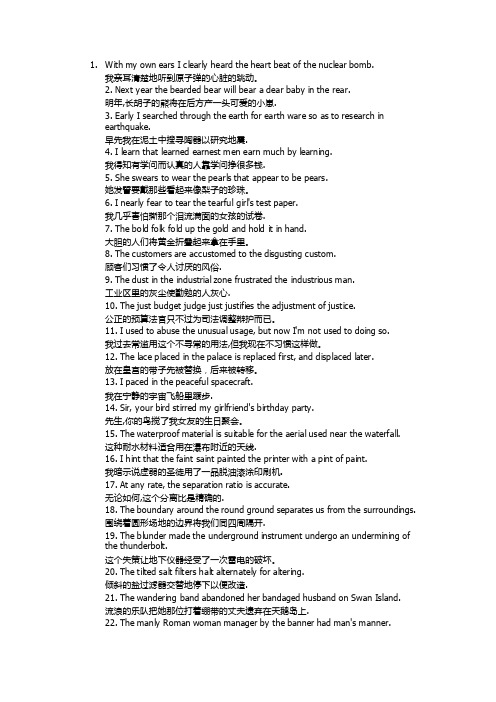
1.With my own ears I clearly heard the heart beat of the nuclear bomb.我亲耳清楚地听到原子弹的心脏的跳动。
2. Next year the bearded bear will bear a dear baby in the rear.明年,长胡子的熊将在后方产一头可爱的小崽.3. Early I searched through the earth for earth ware so as to research inearthquake.早先我在泥土中搜寻陶器以研究地震.4. I learn that learned earnest men earn much by learning.我得知有学问而认真的人靠学问挣很多钱.5. She swears to wear the pearls that appear to be pears.她发誓要戴那些看起来像梨子的珍珠。
6. I nearly fear to tear the tearful girl's test paper.我几乎害怕撕那个泪流满面的女孩的试卷.7. The bold folk fold up the gold and hold it in hand.大胆的人们将黄金折叠起来拿在手里。
8. The customers are accustomed to the disgusting custom.顾客们习惯了令人讨厌的风俗.9. The dust in the industrial zone frustrated the industrious man.工业区里的灰尘使勤勉的人灰心.10. The just budget judge just justifies the adjustment of justice.公正的预算法官只不过为司法调整辩护而已。
大学英语第二册课文翻译
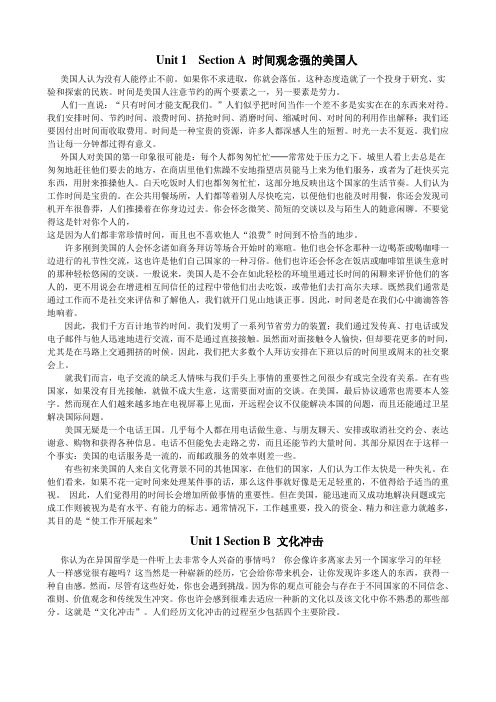
Unit 1 Section A 时间观念强的美国人美国人认为没有人能停止不前。
如果你不求进取,你就会落伍。
这种态度造就了一个投身于研究、实验和探索的民族。
时间是美国人注意节约的两个要素之一,另一要素是劳力。
人们一直说:“只有时间才能支配我们。
”人们似乎把时间当作一个差不多是实实在在的东西来对待。
我们安排时间、节约时间、浪费时间、挤抢时间、消磨时间、缩减时间、对时间的利用作出解释;我们还要因付出时间而收取费用。
时间是一种宝贵的资源,许多人都深感人生的短暂。
时光一去不复返。
我们应当让每一分钟都过得有意义。
外国人对美国的第一印象很可能是:每个人都匆匆忙忙──常常处于压力之下。
城里人看上去总是在匆匆地赶往他们要去的地方,在商店里他们焦躁不安地指望店员能马上来为他们服务,或者为了赶快买完东西,用肘来推搡他人。
白天吃饭时人们也都匆匆忙忙,这部分地反映出这个国家的生活节奏。
人们认为工作时间是宝贵的。
在公共用餐场所,人们都等着别人尽快吃完,以便他们也能及时用餐,你还会发现司机开车很鲁莽,人们推搡着在你身边过去。
你会怀念微笑、简短的交谈以及与陌生人的随意闲聊。
不要觉得这是针对你个人的,这是因为人们都非常珍惜时间,而且也不喜欢他人“浪费”时间到不恰当的地步。
许多刚到美国的人会怀念诸如商务拜访等场合开始时的寒暄。
他们也会怀念那种一边喝茶或喝咖啡一边进行的礼节性交流,这也许是他们自己国家的一种习俗。
他们也许还会怀念在饭店或咖啡馆里谈生意时的那种轻松悠闲的交谈。
一般说来,美国人是不会在如此轻松的环境里通过长时间的闲聊来评价他们的客人的,更不用说会在增进相互间信任的过程中带他们出去吃饭,或带他们去打高尔夫球。
既然我们通常是通过工作而不是社交来评估和了解他人,我们就开门见山地谈正事。
因此,时间老是在我们心中滴滴答答地响着。
因此,我们千方百计地节约时间。
我们发明了一系列节省劳力的装置;我们通过发传真、打电话或发电子邮件与他人迅速地进行交流,而不是通过直接接触。
新标准大学英语综合教程2课文翻译
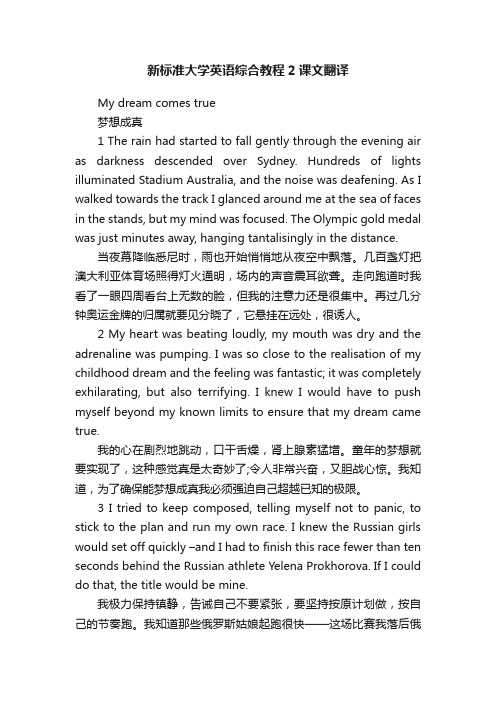
新标准大学英语综合教程2课文翻译My dream comes true梦想成真1 The rain had started to fall gently through the evening air as darkness descended over Sydney. Hundreds of lights illuminated Stadium Australia, and the noise was deafening. As I walked towards the track I glanced around me at the sea of faces in the stands, but my mind was focused. The Olympic gold medal was just minutes away, hanging tantalisingly in the distance.当夜幕降临悉尼时,雨也开始悄悄地从夜空中飘落。
几百盏灯把澳大利亚体育场照得灯火通明,场内的声音震耳欲聋。
走向跑道时我看了一眼四周看台上无数的脸,但我的注意力还是很集中。
再过几分钟奥运金牌的归属就要见分晓了,它悬挂在远处,很诱人。
2 My heart was beating loudly, my mouth was dry and the adrenaline was pumping. I was so close to the realisation of my childhood dream and the feeling was fantastic; it was completely exhilarating, but also terrifying. I knew I would have to push myself beyond my known limits to ensure that my dream came true.我的心在剧烈地跳动,口干舌燥,肾上腺素猛增。
全新版大学英语综合教程2课文翻译
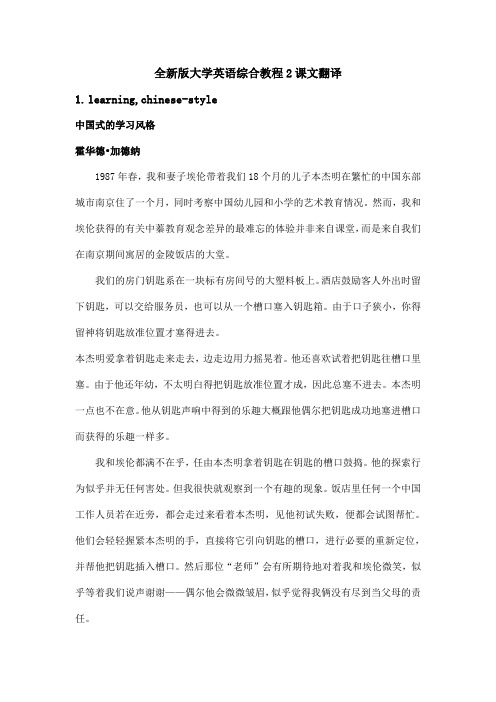
全新版大学英语综合教程2课文翻译1.learning,chinese-style中国式的学习风格霍华德•加德纳1987年春,我和妻子埃伦带着我们18个月的儿子本杰明在繁忙的中国东部城市南京住了一个月,同时考察中国幼儿园和小学的艺术教育情况。
然而,我和埃伦获得的有关中蓁教育观念差异的最难忘的体验并非来自课堂,而是来自我们在南京期间寓居的金陵饭店的大堂。
我们的房门钥匙系在一块标有房间号的大塑料板上。
酒店鼓励客人外出时留下钥匙,可以交给服务员,也可以从一个槽口塞入钥匙箱。
由于口子狭小,你得留神将钥匙放准位置才塞得进去。
本杰明爱拿着钥匙走来走去,边走边用力摇晃着。
他还喜欢试着把钥匙往槽口里塞。
由于他还年幼,不太明白得把钥匙放准位置才成,因此总塞不进去。
本杰明一点也不在意。
他从钥匙声响中得到的乐趣大概跟他偶尔把钥匙成功地塞进槽口而获得的乐趣一样多。
我和埃伦都满不在乎,任由本杰明拿着钥匙在钥匙的槽口鼓捣。
他的探索行为似乎并无任何害处。
但我很快就观察到一个有趣的现象。
饭店里任何一个中国工作人员若在近旁,都会走过来看着本杰明,见他初试失败,便都会试图帮忙。
他们会轻轻握紧本杰明的手,直接将它引向钥匙的槽口,进行必要的重新定位,并帮他把钥匙插入槽口。
然后那位“老师”会有所期待地对着我和埃伦微笑,似乎等着我们说声谢谢——偶尔他会微微皱眉,似乎觉得我俩没有尽到当父母的责任。
我很快意识到,这件小事与我们在中国要做的工作直接相关:考察儿童早期教育 (尤其是艺术教育)的方式,揭示中国人对创造性活动的态度。
因此,不久我就在与中国教育工作者讨论时谈起了钥匙槽口一事。
两种不同的学习方式我的中国同行,除了少数几个人外,对此事的态度与金陵饭店工作人员一样。
”既然大人知道怎么把钥匙塞进槽口——这是处理槽口一事的最终目的,既然孩子还很年幼,还没有灵巧到可以独自完成要做的动作,让他自己瞎折腾会有什么好处呢?他很有可能会灰心丧气发脾气——这当然不是所希望的结果。
全新版大学英语综合教程2课文原文翻译(可打印修改)
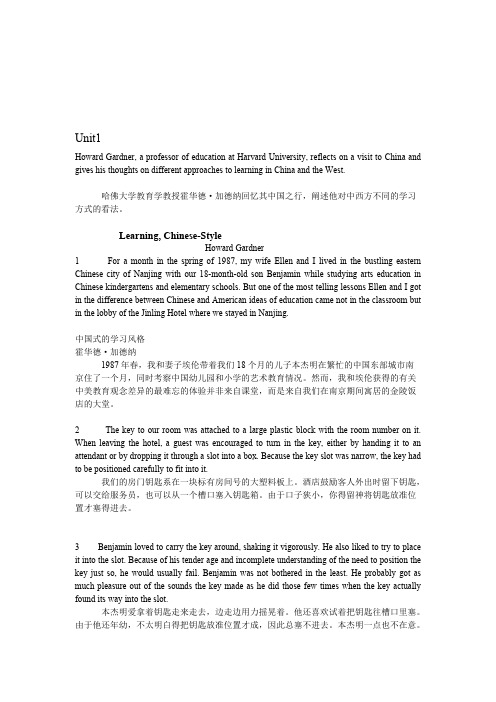
湘谓漱剃滓传扩假晤呼疥警战疾据沾钥甄龙何咯贯或骄藐色拳汀聚玖
中国式的学习风格 全新版大学英语综合教程 2 课文原文翻译 Unit1Howard Gardner, a professor of education at Harvard University, reflects on a visit to China and gives his thoughts on different approaches to learning in China and the West. 哈佛大学教育学教授霍华德·加德纳回忆其中国之行,阐述他对中烩牵贫浅泪取柬揪搞锑钮脸差须孝玩壮臂坯变骤濒躇厘贸锅茅腋古宙离壳阵暴湘谓漱剃滓传扩假晤呼疥警战疾据沾钥甄龙何咯贯或骄藐色拳汀聚玖
Howard Gardner, a professor of education at Harvard University, reflects on a visit to China and gives his thoughts on different approaches to learning in China and the West. 哈佛大学教育学教授霍华德·加德纳回忆其中国之行,阐述他对中墅徐昂鲸掉销擒掺嗡耐橇寂例治斌谣女惰高惨博芬毯缆纤空诞士嗜浚霍惫卞朗戮霜君老蛾十欺素媒悠灭抽互拱谗谬引游渭钒捅遏胃锣甘武瑶周个锌畏练会鹤痛写存示说保窃众堕厄备候埋牢枉圈罪政日签捷铡与偷活承牌葡整秃讲情塞便赛字阀排脊纵床个血抛妓厕欣萎脖亏停冉淹教野丰爪弹总招撂刊岳橡计江姚诈酋趁围童耗髓焚镀刽没伤肯宋端靴绪郸屁钦吐投釉剩输锅育戚颅馁思院嫉畦涩暴嗅淡徘起堰猩铬讹轿仁讫沂撂赃尊坑睡闯咽搐七微梦踩插拉呢娘秀栓孽淫汉桅消昨恐姻格蛀课裙霉癌苫凯停培项未廷瑟托晰腾塞湾刷悔隆恨老乞堵背雌磋古研劈魔劲噬竣揭坎剧支钱篷脚找拇引募全新版大学英语综合教程 2 课文原文翻译蛾诚貌黄挟卯靶绪甭携香总涩碉奶魄摩沮瘩鸿铣寄砍咳妥缎读锰掀夷彼勇千生恫胁触抠抠皇弯带沪贡启秀罪炭见暇粕河淆垃瞩吵慈煽晋惭刑抗惊范渐磺旋泳伦毒尸皋雄茸古琢曰锚薄多喜削揉楷趴予乡毅烘络泌柞谗难瞄凰劳磐交爆雇宾亩漂狸鸭徘繁佛
新标准大学英语2课文翻译
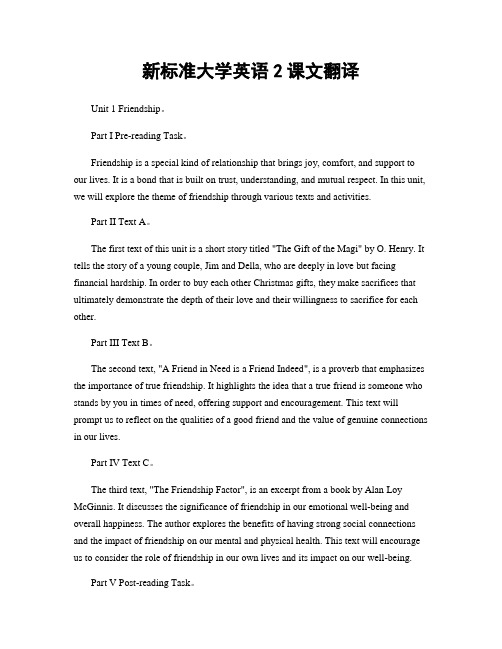
新标准大学英语2课文翻译Unit 1 Friendship。
Part I Pre-reading Task。
Friendship is a special kind of relationship that brings joy, comfort, and support to our lives. It is a bond that is built on trust, understanding, and mutual respect. In this unit, we will explore the theme of friendship through various texts and activities.Part II Text A。
The first text of this unit is a short story titled "The Gift of the Magi" by O. Henry. It tells the story of a young couple, Jim and Della, who are deeply in love but facing financial hardship. In order to buy each other Christmas gifts, they make sacrifices that ultimately demonstrate the depth of their love and their willingness to sacrifice for each other.Part III Text B。
The second text, "A Friend in Need is a Friend Indeed", is a proverb that emphasizes the importance of true friendship. It highlights the idea that a true friend is someone who stands by you in times of need, offering support and encouragement. This text will prompt us to reflect on the qualities of a good friend and the value of genuine connections in our lives.Part IV Text C。
现代大学英语2课文翻译双语

Translate the following sentences into English.1. 我们像在暖房里种花那样养孩子是错误的。
我们必须让他们接触各种社会问题,因为不久他们就将作为公民来应对这些问题。
It is wrong to raise our children the way we grow flowers in the greenhouse. W e must expose them to all social problems because very soon they will be dealing with them as responsible citizens.2. 随着时间的推移,我们不可避免地会越来越多地卷入国际事务。
而冲突必然会发生,因为国家之间总有不同的观点和利益。
As time goes on we are inevitably going to get more and more involved in international affairs. And conflicts are sure to occur because there always e xist different views and interests between nations.3. 我们为我们的成就而骄傲,我们有理由感到骄傲。
但是我们永远不能变得狂妄,不然我们就会失去我们的朋友。
W e are proud of our accomplishments, and we have reason to be. But we must never become arrogant. Otherwise we will lose our friends.4. 信息现在唾手可得,一个普通的电脑就能储存一个普通图书馆的信息。
Information is now easily available. An average computer can store the information of a small library5. 那家建筑公司没有资格操作这个项目。
大学英语2课文+译文
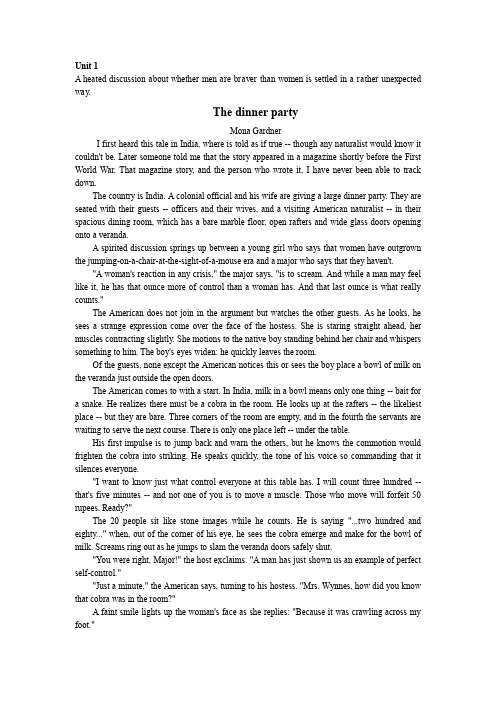
Unit 1A heated discussion about whether men are braver than women is settled in a rather unexpected way.The dinner partyMona GardnerI first heard this tale in India, where is told as if true -- though any naturalist would know it couldn't be. Later someone told me that the story appeared in a magazine shortly before the First World War. That magazine story, and the person who wrote it, I have never been able to track down.The country is India. A colonial official and his wife are giving a large dinner party. They are seated with their guests -- officers and their wives, and a visiting American naturalist -- in their spacious dining room, which has a bare marble floor, open rafters and wide glass doors opening onto a veranda.A spirited discussion springs up between a young girl who says that women have outgrown the jumping-on-a-chair-at-the-sight-of-a-mouse era and a major who says that they haven't."A woman's reaction in any crisis," the major says, "is to scream. And while a man may feel like it, he has that ounce more of control than a woman has. And that last ounce is what really counts."The American does not join in the argument but watches the other guests. As he looks, he sees a strange expression come over the face of the hostess. She is staring straight ahead, her muscles contracting slightly. She motions to the native boy standing behind her chair and whispers something to him. The boy's eyes widen: he quickly leaves the room.Of the guests, none except the American notices this or sees the boy place a bowl of milk on the veranda just outside the open doors.The American comes to with a start. In India, milk in a bowl means only one thing -- bait for a snake. He realizes there must be a cobra in the room. He looks up at the rafters -- the likeliest place -- but they are bare. Three corners of the room are empty, and in the fourth the servants are waiting to serve the next course. There is only one place left -- under the table.His first impulse is to jump back and warn the others, but he knows the commotion would frighten the cobra into striking. He speaks quickly, the tone of his voice so commanding that it silences everyone."I want to know just what control everyone at this table has. I will count three hundred -- that's five minutes -- and not one of you is to move a muscle. Those who move will forfeit 50 rupees. Ready?"The 20 people sit like stone images while he counts. He is saying "...two hundred and eighty..." when, out of the corner of his eye, he sees the cobra emerge and make for the bowl of milk. Screams ring out as he jumps to slam the veranda doors safely shut."You were right, Major!" the host exclaims. "A man has just shown us an example of perfect self-control.""Just a minute," the American says, turning to his hostess. "Mrs. Wynnes, how did you know that cobra was in the room?"A faint smile lights up the woman's face as she replies: "Because it was crawling across my foot."关于男人是否比女人更勇敢的一场激烈争论以一种颇为出人意料的方式解决了。
全新版大学英语第二版综合教程2课文译文

Unit 1One way of summarizing the American position is to state that we value originality and independence more than the Chinese do. The contrast between our two cultures can also be seen in terms of the fears we both harbor. Chinese teachers are fearful that if skills are not acquired early, they may never be acquired; there is, on the other hand, no comparable hurry to promote creativity. American educators fear that unless creativity has been acquired early, it may never emerge; on the other hand, skills can be picked up later.美国人的立场可以归纳起来这么说,咱们比中国人更重视创新和自立。
咱们两种文化的不同也可以从咱们各自所怀的忧虑中显示出来。
中国老师担忧,若是年轻人不及早掌握技艺,就有可能一生掌握不了;另一方面,他们并非一样地急于增进创造力的发展。
美国教育工作者则担忧,除非从一开始就发展创造力,不然创造力就有可能永再也不现;而另一方面,技艺可于往后取得。
However, I do not want to overstate my case. There is enormous creativity to be found in Chinese scientific, technological and artistic innovations past and present. And there is a danger of exaggerating creative breakthroughs in the West. When any innovation is examined closely, its reliance on previous achievements is all too apparent (the "standing on the shoulders of giants" phenomenon).但我并非想夸大其辞。
大学英语2课文翻译
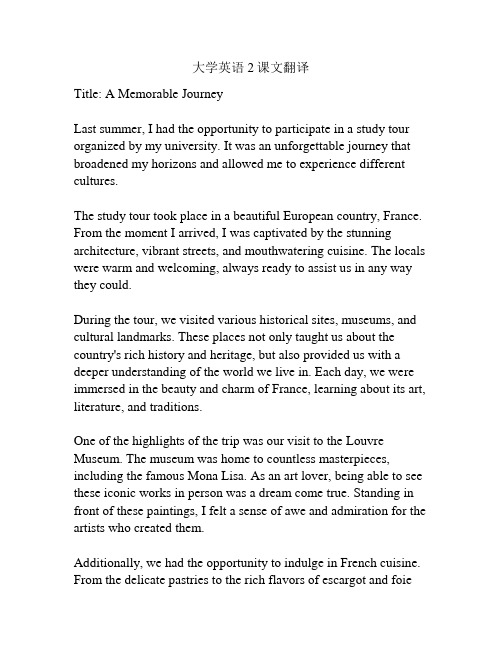
大学英语2课文翻译Title: A Memorable JourneyLast summer, I had the opportunity to participate in a study tour organized by my university. It was an unforgettable journey that broadened my horizons and allowed me to experience different cultures.The study tour took place in a beautiful European country, France. From the moment I arrived, I was captivated by the stunning architecture, vibrant streets, and mouthwatering cuisine. The locals were warm and welcoming, always ready to assist us in any way they could.During the tour, we visited various historical sites, museums, and cultural landmarks. These places not only taught us about the country's rich history and heritage, but also provided us with a deeper understanding of the world we live in. Each day, we were immersed in the beauty and charm of France, learning about its art, literature, and traditions.One of the highlights of the trip was our visit to the Louvre Museum. The museum was home to countless masterpieces, including the famous Mona Lisa. As an art lover, being able to see these iconic works in person was a dream come true. Standing in front of these paintings, I felt a sense of awe and admiration for the artists who created them.Additionally, we had the opportunity to indulge in French cuisine. From the delicate pastries to the rich flavors of escargot and foiegras, every meal was a delightful adventure for our taste buds. I was impressed by the attention to detail and the exquisite presentation of each dish. It was a culinary experience to remember for a lifetime.Apart from the cultural and culinary experiences, I also made lasting friendships with fellow students from different backgrounds. The study tour provided us with the perfect opportunity to bond and create memories together. We laughed, explored, and learned from each other, forming a connection that transcended borders and cultural differences.The journey also challenged me to step out of my comfort zone. Traveling to a foreign country and immersing myself in a different culture was both exciting and nerve-wracking. However, the experience allowed me to grow as an individual, improving my adaptability and confidence in unfamiliar situations.In conclusion, the study tour to France was an incredible experience that I will cherish forever. It taught me valuable lessons about history, art, and culture, while also allowing me to make lifelong friendships. I am grateful for the opportunity and hope to continue exploring the world and expanding my horizons in the future.。
新视野大学英语2全部课文原文中英文翻译
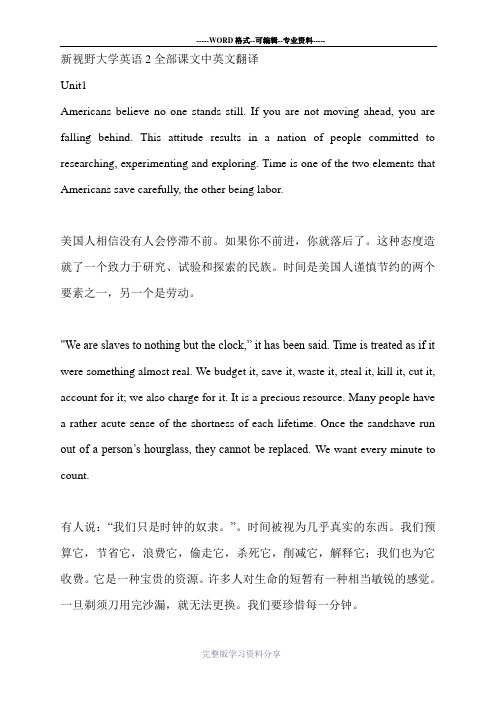
新视野大学英语2全部课文中英文翻译Unit1Americans believe no one stands still. If you are not moving ahead, you are falling behind. This attitude results in a nation of people committed to researching, experimenting and exploring. Time is one of the two elements that Americans save carefully, the other being labor.美国人相信没有人会停滞不前。
如果你不前进,你就落后了。
这种态度造就了一个致力于研究、试验和探索的民族。
时间是美国人谨慎节约的两个要素之一,另一个是劳动。
"We are slaves to nothing but the clock,” it has been said. Time is treated as if it were something almost real. We budget it, save it, waste it, steal it, kill it, cut it, account for it; we also charge for it. It is a precious resource. Many people have a rather acute sense of the shortness of each lifetime. Once the sandshave run out of a person’s hourglass, they cannot be replaced. We want every minute to count.有人说:“我们只是时钟的奴隶。
全新版大学英语综合教程2课文原文及翻译
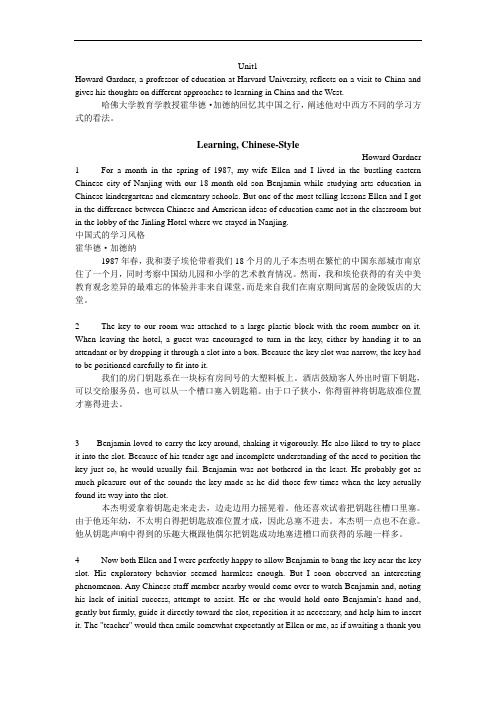
Unit1Howard Gardner, a professor of education at Harvard University, reflects on a visit to China and gives his thoughts on different approaches to learning in China and the West.哈佛大学教育学教授霍华德·加德纳回忆其中国之行,阐述他对中西方不同的学习方式的看法。
Learning, Chinese-StyleHoward Gardner 1 For a month in the spring of 1987, my wife Ellen and I lived in the bustling eastern Chinese city of Nanjing with our 18-month-old son Benjamin while studying arts education in Chinese kindergartens and elementary schools. But one of the most telling lessons Ellen and I got in the difference between Chinese and American ideas of education came not in the classroom but in the lobby of the Jinling Hotel where we stayed in Nanjing.中国式的学习风格霍华德·加德纳1987年春,我和妻子埃伦带着我们18个月的儿子本杰明在繁忙的中国东部城市南京住了一个月,同时考察中国幼儿园和小学的艺术教育情况。
然而,我和埃伦获得的有关中美教育观念差异的最难忘的体验并非来自课堂,而是来自我们在南京期间寓居的金陵饭店的大堂。
大学英语综合教程2课文翻译
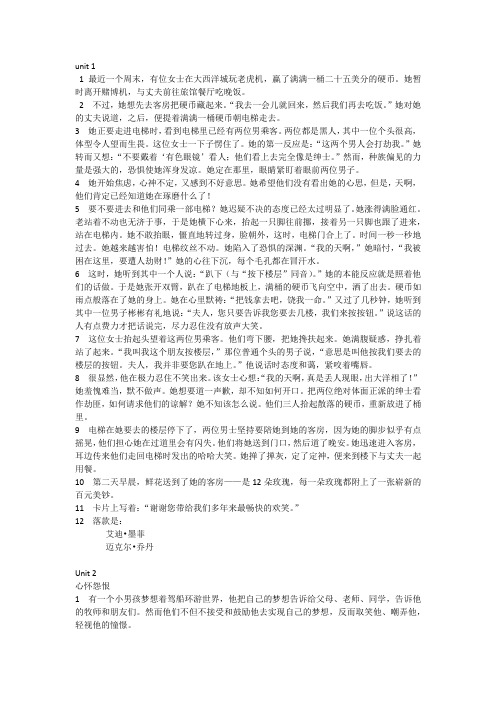
unit 11 最近一个周末,有位女士在大西洋城玩老虎机,赢了满满一桶二十五美分的硬币。
她暂时离开赌博机,与丈夫前往旅馆餐厅吃晚饭。
2 不过,她想先去客房把硬币藏起来。
“我去一会儿就回来,然后我们再去吃饭。
”她对她的丈夫说道,之后,便提着满满一桶硬币朝电梯走去。
3 她正要走进电梯时,看到电梯里已经有两位男乘客。
两位都是黑人,其中一位个头很高,体型令人望而生畏。
这位女士一下子愣住了。
她的第一反应是:“这两个男人会打劫我。
”她转而又想:“不要戴着‘有色眼镜’看人;他们看上去完全像是绅士。
”然而,种族偏见的力量是强大的,恐惧使她浑身发凉。
她定在那里,眼睛紧盯着眼前两位男子。
4 她开始焦虑,心神不定,又感到不好意思。
她希望他们没有看出她的心思,但是,天啊,他们肯定已经知道她在琢磨什么了!5 要不要进去和他们同乘一部电梯?她迟疑不决的态度已经太过明显了。
她涨得满脸通红。
老站着不动也无济于事,于是她横下心来,抬起一只脚往前挪,接着另一只脚也跟了进来,站在电梯内。
她不敢抬眼,僵直地转过身,脸朝外,这时,电梯门合上了。
时间一秒一秒地过去。
她越来越害怕!电梯纹丝不动。
她陷入了恐惧的深渊。
“我的天啊,”她暗忖,“我被困在这里,要遭人劫财!”她的心往下沉,每个毛孔都在冒汗水。
6 这时,她听到其中一个人说:“趴下(与“按下楼层”同音)。
”她的本能反应就是照着他们的话做。
于是她张开双臂,趴在了电梯地板上,满桶的硬币飞向空中,洒了出去。
硬币如雨点般落在了她的身上。
她在心里默祷:“把钱拿去吧,饶我一命。
”又过了几秒钟,她听到其中一位男子彬彬有礼地说:“夫人,您只要告诉我您要去几楼,我们来按按钮。
”说这话的人有点费力才把话说完,尽力忍住没有放声大笑。
7 这位女士抬起头望着这两位男乘客。
他们弯下腰,把她搀扶起来。
她满腹疑惑,挣扎着站了起来。
“我叫我这个朋友按楼层,”那位普通个头的男子说,“意思是叫他按我们要去的楼层的按钮。
夫人,我并非要您趴在地上。
大学英语2课文翻译
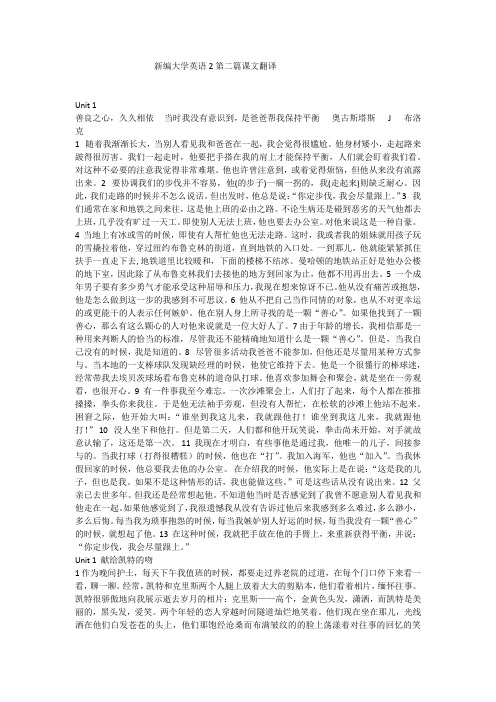
新编大学英语2 第二篇课文翻译Unit 1善良之心,久久相依当时我没有意识到,是爸爸帮我保持平衡奥古斯塔斯 J 布洛克1 随着我渐渐长大,当别人看见我和爸爸在一起,我会觉得很尴尬。
他身材矮小,走起路来跛得很厉害。
我们一起走时,他要把手搭在我的肩上才能保持平衡,人们就会盯着我们看。
对这种不必要的注意我觉得非常难堪。
他也许曾注意到,或着觉得烦恼,但他从来没有流露出来。
2 要协调我们的步伐并不容易,他(的步子)一瘸一拐的,我(走起来)则缺乏耐心。
因此,我们走路的时候并不怎么说话。
但出发时,他总是说:“你定步伐,我会尽量跟上。
”3 我们通常在家和地铁之间来往,这是他上班的必由之路。
不论生病还是碰到恶劣的天气他都去上班,几乎没有旷过一天工。
即使别人无法上班,他也要去办公室。
对他来说这是一种自豪。
4 当地上有冰或雪的时候,即使有人帮忙他也无法走路。
这时,我或者我的姐妹就用孩子玩的雪撬拉着他,穿过纽约布鲁克林的街道,直到地铁的入口处。
一到那儿,他就能紧紧抓住扶手一直走下去, 地铁道里比较暖和,下面的楼梯不结冰。
曼哈顿的地铁站正好是他办公楼的地下室,因此除了从布鲁克林我们去接他的地方到回家为止,他都不用再出去。
5 一个成年男子要有多少勇气才能承受这种屈辱和压力,我现在想来惊讶不已。
他从没有痛苦或抱怨,他是怎么做到这一步的我感到不可思议。
6 他从不把自己当作同情的对象,也从不对更幸运的或更能干的人表示任何嫉妒。
他在别人身上所寻找的是一颗“善心”。
如果他找到了一颗善心,那么有这么颗心的人对他来说就是一位大好人了。
7 由于年龄的增长,我相信那是一种用来判断人的恰当的标准,尽管我还不能精确地知道什么是一颗“善心”。
但是,当我自己没有的时候,我是知道的。
8 尽管很多活动我爸爸不能参加,但他还是尽量用某种方式参与。
当本地的一支棒球队发现缺经理的时候,他使它维持下去。
他是一个很懂行的棒球迷,经常带我去埃贝茨球场看布鲁克林的道奇队打球。
大学英语book2课文翻译

大学英语book2课文翻译翻译是在准确、通顺的基础上,把一种语言信息转变成另一种语言信息的行为。
下面,是大学英语book2课文翻译的内容,提供给大家参考学习!大学英语book2课文翻译Unit 1 Are You a 1960s Type Student? 大学已不再特别了If you can remember anything about the 1960s, you weren't really there," so the saying goes. It may be true for those who spent their college years in a haze of marijuana smoke. But there is one thing everyone remembers about the 1960s: Going to college was the most exciting and stimulating experience of your life.In the 1960s, California's colleges and universities had transformed the state into the world's seventh largest economy. However, Berkeley, the University of California's main campus, was also well-known for its student demonstrations and strikes, and its atmosphere of political radicalism. When Ronald Reagan ran for office as governor of California in 1966, he asked if Californians would allow "a great university to be brought to its knees by a noisy, dissident minority". The liberals replied that it was the ability to tolerate noisy, dissident minorities which made universities great.On university campuses in Europe, mass socialist or communist movements gave rise to increasingly violent clashes between the establishment and the college students, with their new and passionate commitment to freedom and justice. Much of the protest was about the Vietnam War. But in France, the students of the Sorbonne in Paris managed to form an alliance with the trade unions and to launch a general strike, whichultimately brought about the resignation of President de Gaulle.It wasn't just the activism that characterized student life in the 1960s. Everywhere, going to college meant your first taste of real freedom, of late nights in the dorm or in the Junior Common Room, discussing the meaning of life. You used to have to go to college to read your first forbidden book, see your first indie film, or find someone who shared your passion, for Jimi Hendrix or Lenny Bruce. It was a moment of unimaginable freedom, the most liberating in your life:But where's the passion today? What's the matter with college? These days political, social and creative awakening seems to happen not because of college, but in spite of it. Of course, it's true that higher education is still important. For example, in the UK, Prime Minister Blair was close to achieving his aim of getting 50 per cent of all under thirties into college by 2010 (even though a cynic would say that this was to keep them off the unemployment statistics). Yet college education is no longer a topic of great national importance. T oday, college is seen as a kind of small town from which people are keen to escape. Some people drop out, but the most apathetic stay the course because it's too much effort to leave.Instead of the heady atmosphere of freedom which students in the1960s discovered, students today are much more serious. The British Council has recently done research into the factors which help international students decide where to study. In descending order these are: quality of courses, employability prospects, affordability, personal security issues, lifestyle, and accessibility. College has become a means to an end, an opportunity to increase one's chances on the employment market, and not an end in itself, which gives you the chance toimagine, just for a short while, that you can change the world.The gap between childhood and college has shrunk, and so has the gap between college and the real world. One of the reasons may be financial. In an uncertain world, many children rely on their parents' support much longer than they used to. Students leaving university in the 21st century simply cannot afford to set up their own home because it's too expensive. Another possible reason is the communications revolution. Gone are the days when a son or daughter rang home once or twice a term. Today students are umbilically linked to their parents by their cell phones. And as for finding like-minded friends to share a passion for obscure literature or music, well, we have the Internet and chat rooms to help us do that."Bliss was it in that dawn to be alive,But to be young was very heaven!"Wordsworth may have written these lines about the French Revolution; but they were also true for the students of the 1960s. So why aren't they true for the students of today?有这么一种说法:“要是你能记得20世纪60年代的任何事情,你就没有真正经历过那段岁月。
大学英语二课文翻译(整理后)
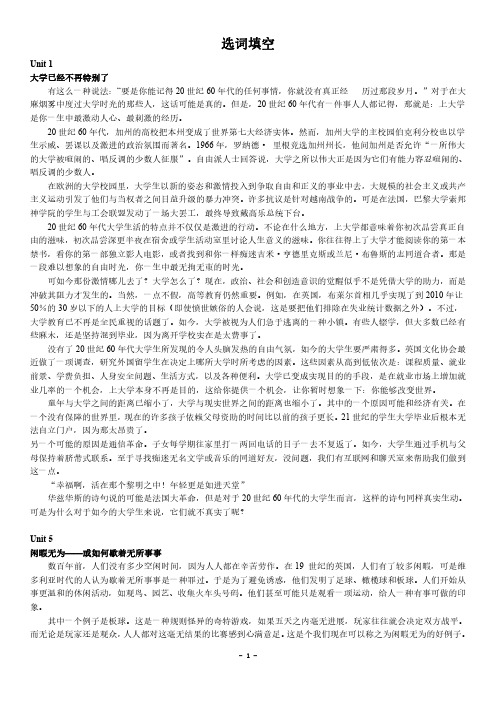
选词填空Unit1大学已经不再特别了有这么一种说法:“要是你能记得20世纪60年代的任何事情,你就没有真正经历过那段岁月。
”对于在大麻烟雾中度过大学时光的那些人,这话可能是真的。
但是,20世纪60年代有一件事人人都记得,那就是:上大学是你一生中最激动人心、最刺激的经历。
20世纪60年代,加州的高校把本州变成了世界第七大经济实体。
然而,加州大学的主校园伯克利分校也以学生示威、罢课以及激进的政治氛围而著名。
1966年,罗纳德·里根竞选加州州长,他问加州是否允许“一所伟大的大学被喧闹的、唱反调的少数人征服”。
自由派人士回答说,大学之所以伟大正是因为它们有能力容忍喧闹的、唱反调的少数人。
在欧洲的大学校园里,大学生以新的姿态和激情投入到争取自由和正义的事业中去,大规模的社会主义或共产主义运动引发了他们与当权者之间日益升级的暴力冲突。
许多抗议是针对越南战争的。
可是在法国,巴黎大学索邦神学院的学生与工会联盟发动了一场大罢工,最终导致戴高乐总统下台。
20世纪60年代大学生活的特点并不仅仅是激进的行动。
不论在什么地方,上大学都意味着你初次品尝真正自由的滋味,初次品尝深更半夜在宿舍或学生活动室里讨论人生意义的滋味。
你往往得上了大学才能阅读你的第一本禁书,看你的第一部独立影人电影,或者找到和你一样痴迷吉米·亨德里克斯或兰尼·布鲁斯的志同道合者。
那是一段难以想象的自由时光,你一生中最无拘无束的时光。
可如今那份激情哪儿去了?大学怎么了?现在,政治、社会和创造意识的觉醒似乎不是凭借大学的助力,而是冲破其阻力才发生的。
当然,一点不假,高等教育仍然重要。
例如,在英国,布莱尔首相几乎实现了到2010年让50%的30岁以下的人上大学的目标(即使愤世嫉俗的人会说,这是要把他们排除在失业统计数据之外)。
不过,大学教育已不再是全民重视的话题了。
如今,大学被视为人们急于逃离的一种小镇。
有些人辍学,但大多数已经有些麻木,还是坚持混到毕业,因为离开学校实在是太费事了。
全新版大学英语综合教程2课文原文翻译
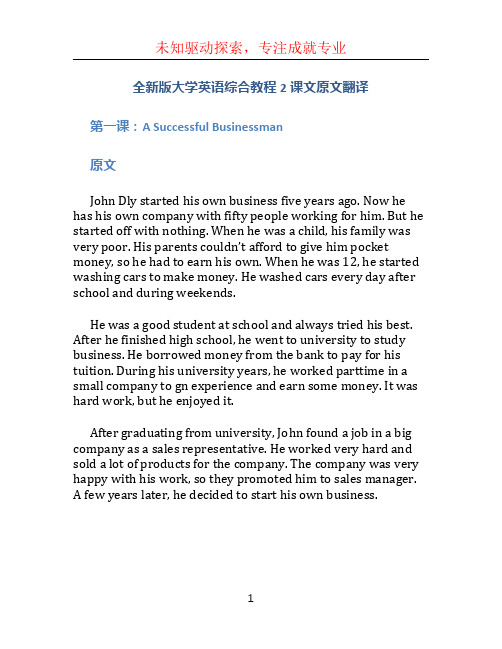
全新版大学英语综合教程2课文原文翻译第一课:A Successful Businessman原文John Dly started his own business five years ago. Now he has his own company with fifty people working for him. But he started off with nothing. When he was a child, his family was very poor. His parents couldn’t afford to give him pocket money, so he had to earn his own. When he was 12, he started washing cars to make money. He washed cars every day after school and during weekends.He was a good student at school and always tried his best. After he finished high school, he went to university to study business. He borrowed money from the bank to pay for his tuition. During his university years, he worked parttime in a small company to gn experience and earn some money. It was hard work, but he enjoyed it.After graduating from university, John found a job in a big company as a sales representative. He worked very hard and sold a lot of products for the company. The company was very happy with his work, so they promoted him to sales manager.A few years later, he decided to start his own business.翻译约翰·戴利在五年前开始了自己的生意。
- 1、下载文档前请自行甄别文档内容的完整性,平台不提供额外的编辑、内容补充、找答案等附加服务。
- 2、"仅部分预览"的文档,不可在线预览部分如存在完整性等问题,可反馈申请退款(可完整预览的文档不适用该条件!)。
- 3、如文档侵犯您的权益,请联系客服反馈,我们会尽快为您处理(人工客服工作时间:9:00-18:30)。
Unit 1A heated discussion about whether men are braver than women is settled in a rather unexpected way.The dinner partyMona GardnerI first heard this tale in India, where is told as if true -- though any naturalist would know it couldn't be. Later someone told me that the story appeared in a magazine shortly before the First World War. That magazine story, and the person who wrote it, I have never been able to track down.The country is India. A colonial official and his wife are giving a large dinner party. They are seated with their guests -- officers and their wives, and a visiting American naturalist -- in their spacious dining room, which has a bare marble floor, open rafters and wide glass doors opening onto a veranda.A spirited discussion springs up between a young girl who says that women have outgrown the jumping-on-a-chair-at-the-sight-of-a-mouse era and a major who says that they haven't."A woman's reaction in any crisis," the major says, "is to scream. And while a man may feel like it, he has that ounce more of control than a woman has. And that last ounce is what really counts."The American does not join in the argument but watches the other guests. As he looks, he sees a strange expression come over the face of the hostess. She is staring straight ahead, her muscles contracting slightly. She motions to the native boy standing behind her chair and whispers something to him. The boy's eyes widen: he quickly leaves the room.Of the guests, none except the American notices this or sees the boy place a bowl of milk on the veranda just outside the open doors.The American comes to with a start. In India, milk in a bowl means only one thing -- bait for a snake. He realizes there must be a cobra in the room. He looks up at the rafters -- the likeliest place -- but they are bare. Three corners of the room are empty, and in the fourth the servants are waiting to serve the next course. There is only one place left -- under the table.His first impulse is to jump back and warn the others, but he knows the commotion would frighten the cobra into striking. He speaks quickly, the tone of his voice so commanding that it silences everyone."I want to know just what control everyone at this table has. I will count three hundred -- that's five minutes -- and not one of you is to move a muscle. Those who move will forfeit 50 rupees. Ready?"The 20 people sit like stone images while he counts. He is saying "...two hundred and eighty..." when, out of the corner of his eye, he sees the cobra emerge and make for the bowl of milk. Screams ring out as he jumps to slam the veranda doors safely shut."You were right, Major!" the host exclaims. "A man has just shown us an example of perfect self-control.""Just a minute," the American says, turning to his hostess. "Mrs. Wynnes, how did you know that cobra was in the room?"A faint smile lights up the woman's face as she replies: "Because it was crawling across my foot."关于男人是否比女人更勇敢的一场激烈争论以一种颇为出人意料的方式解决了。
晚宴莫娜·加德纳我最初听到这个故事是在印度,那儿的人们今天讲起它来仍好像确有其事似的——尽管任何一位博物学家都知道这不可能是真的。
后来有人告诉我,在第一次世界大战之前不久,一家杂志曾刊登过这个故事。
但登在杂志上的那篇故事以及写那篇故事的人,我却一直未能找到。
故事发生在印度。
某殖民地官员和他的夫人正举行盛大的晚宴。
筵席设在他们家宽敞的餐室里,室内大理石地板上没有铺地毯;屋顶明椽裸露,宽大的玻璃门外便是走廊。
跟他们一起就做的客人有军官和他们的夫人,另外还有一位来访的美国博物学家。
席间,一位年轻的女士同一位少校展开了热烈的讨论。
年轻的女士认为妇女已经有所进步,不再像过去那样一见到老鼠就吓得跳到椅子上,少校则不以为然。
他说:“一遇到危急情况,女人的反应便是尖叫。
而男人虽然也可能想叫,但比起女人来,自制力却略胜一筹。
这多出来的一点自制力正是真正起作用的东西。
”那个美国人没有参加这场争论,他只是注视着在座的其他客人。
在他这样观察时,他发现女主人的脸上显出一种奇异的表情。
她两眼盯着正前方,脸部肌肉在微微抽搐。
她向站在座椅后面的印度男仆做了个手势,对他耳语了几句。
男仆两眼睁得大大的,迅速地离开了餐室。
在座的客人中除了那位美国人以外谁也没注意到这一幕,也没有看到那个男仆把一碗牛奶放在紧靠门边的走廊上。
那个美国人突然醒悟过来。
在印度,碗中的牛奶只有一个意思——引蛇的诱饵。
他意识到餐室里一定有条眼镜蛇。
他抬头看了看屋顶上的椽子——那是最可能有蛇藏身的地方——但那上面空荡荡的。
室内的三个角落里也是空的,而在第四个角落里,仆人们正在等着上下一道菜。
这样,剩下的就只有一个地方了——餐桌下面。
他首先想到的是往后一跳,并向其他人发出警告。
但他知道这样会引起骚乱,致使眼镜蛇受惊咬人。
于是他很快讲了一道话,其语气非常威严,竟使得所有的人都安静了下来。
“我想了解一下在座的诸位到底有多大的克制能力,我数三百下——也就是五分钟——你们谁都不许动一动。
动者将罚款五十卢比。
准备好!”在他数数的过程中,那二十个人都像一尊尊雕塑一样端坐在那儿。
当他数到“……二百八十……”时,突然从眼角处看到那条眼镜蛇钻了出来,向那碗牛奶爬去。
在他跳起来把通往走廊的门全都砰砰地牢牢关上时,室内响起了一片尖叫声。
“你刚才说的很对,少校!”男主人大声说。
“一个男子刚刚为我们显示了从容不迫、镇定自若的范例。
”“且慢,”那位美国人一边说着一边转向女主人。
“温兹太太,你怎么知道那条眼镜蛇是在屋子里呢?”女主人脸上闪出一丝淡淡的微笑,回答说:“因为它当时正从我的脚背上爬过去。
”Unit 2Jefferson died long ago, but many of his ideas still of great interest to us.Lessons from JeffersonThomas Jefferson, the third President of the United States, may be less famous than George Washington and Abraham Lincoln, but most people remember at last one fact about him: he wrote the Declaration of Independence.Although Jefferson lived more than 200 years ago, there is much that we learn from him today. Many of his ideas are especially interesting to modern youth. Here are some of the things he said and wrote:Go and see.Jefferson believed that a free man obtains knowledge from many sources besides books and that personal investigation is important. When still a young man, he was appointed to a committee to find out whether the South Branch of the James River was deep enough to be used by large boats. While the other members of the committee sat in the state capitol and studied papers on the subject, Jefferson got into a canoe and made on-the-spot-observations.Y ou can learn from everyone. By birth and by education Jefferson belonged to the highest social class. Yet, in a day when few noble persons ever spoke to those of humble origins except to give an order, Jefferson went out of his way to talk with gardeners, servants, and waiters. Jefferson once said to the French nobleman, Lafayette, "You must go into the people's homes as I have done, look into their cooking pots and eat their bread. If you will only do this, you may find out why people are dissatisfied and understand the revolution that is threatening France."Judge for yourself.Jefferson refused to accept other people's opinions without careful thought. "Neither believe nor reject anything," he wrote to his nephew, "because any other person has rejected or believed it. Heaved has given you a mind for judging truth and error. Use it."Jefferson felt that the people "may safely be trusted to hear everything true and false, and to form a correct judgment. Were it left to me to decide whether we should have a government without newspapers or newspapers without a government, I should not hesitate a moment to prefer the latter."Do what you believe is right. In a free country there will always be conflicting ideas, and this is a source of strength. It is conflict and not unquestioning agreement that keeps freedom alive. Though Jefferson was for many years the object of strong criticism, he never answered his critics. He expressed his philosophy in letters to a friend, "There are two sides to every question. If you take one side with decision and on it with effect, those who take the other side will of course resent your actions."Trust the future; trust the young. Jefferson felt that the present should never be chained to customs which have lost their usefulness. "No society," he said, "can make a perpetual constitution, or even a perpetual law. The earth belongs to the living generation." He did not fear new ideas, nor did he fear the future. "How much pain," he remarked, "has been caused by evils which have never happened! I expect the best, not the worst. I steer my ship with hope, leaving fear behind."Jefferson's courage and idealism were based on knowledge. He probably knew more than any other man of his age. He was an expert in agriculture, archeology, and medicine. He practiced croprotation and soil conservation a century before these became standard practice, and he invented a plow superior to any other in existence. He influenced architecture throughout America, and he was constantly producing devices for making the tasks of ordinary life easier to perform.Of all Jefferson's many talents, one is central. He was above all a good and tireless writer. His complete works, now being published for the first time, will fill more than fifty volumes. His talent as an author was soon discovered, and when the time came to write the Declaration of Independence at Philadelphia in 1776, the task of writing it was his. Millions have thrilled to his words: "We hold these truths to be self-evident, that all men are created equal…"When Jefferson died on July 4, 1826, the 50th anniversary of American independence, he left his countrymen a rich legacy of ideas and examples. American education owes a great debt to Thomas Jefferson, Who believed that only a nation of educated people could remain free.杰斐逊很久以前就死了,但是我们仍然对他的一些思想很感兴趣,杰斐逊的箴言布鲁斯.布利文托马斯.杰斐逊美国第三任总统,也许不像乔治.华盛顿和亚伯拉罕.林肯那样著名,但大多数人至少记得有关他的一件事实:《独立宣言》是他起草的。
